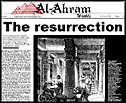
Issue No. 608
Region
Previous issue
Site map
 |
17 - 23
October 2002 Issue No. 608 Region |
Current issue Previous issue Site map | |
| Published in Cairo by AL-AHRAM established in 1875 | Recommend this page | ||
"The largest prison in the world"
Between three and five Palestinian civilians are being killed in Palestine on any given day. Does this suggest an Israeli de facto "death quota"? Khaled Amayreh reports from Hebron
As if last week's massacre in Khan Yunis was not enough, the Israeli army has kept up the carnage this week, killing even more Palestinian civilians.
Click to view captionPalestinians living in Nablus have been stuck in their homes for weeks under Israel's crippling curfew
The killing often seems so wanton and unprovoked that many observers are now concluding that the Israeli army is carrying out unwritten instructions to kill an average of five or six Palestinians, and maim as many, on any given day.
Predictably, the Israeli army denies that such instructions exist. In Nablus, for example, Israeli soldiers, in armoured personnel carriers, didn't hesitate to open fire on school children this week, killing two. Their "crime" was "violating the curfew" and "going to school".
This barbaric behaviour manifests itself on a daily basis in the streets of Nablus, Jenin, Rafah and Khan Yunis. Not a day passes without a Palestinian child, housewife or labourer being murdered by Israeli occupation soldiers.
Such was the fate of Mohamed, the 10-year-old, who was killed with a single bullet to the head at the Brazil refugee camp in Rafah on 9 October. The same fate met another, 17- year-old boy, also at the Brazil camp and on the same day. He was killed for appearing in the cross-hairs of Israeli snipers.
For the Israeli army it has been business as usual. The Israeli response to the killings was a statement saying that "two Palestinians were killed by IDF fire in vague circumstances."
The same "vague circumstances" repeated themselves on 11 October, this time in Nablus, when an Israeli jeep suddenly stopped in front of the home of the Abu Hijleh family and riddled their glass verandah with machine-gun fire.
Shaden Abu Hijleh was killed instantly. Her husband, Dr Jamal Abu Hijleh and their son were injured by shrapnel.
The "routine activities" continued unabated, this time in Rafah at the southern edge of the Gaza Strip.
There, on 13 October, Israeli tanks and military bulldozers attacked civilian neighbourhoods shortly after midnight, as women and children were sleeping in their homes.
In one particularly gruesome incident, a three-year-old named Tawfik Breika was crushed to death when an Israeli tank crushed the home where he was sleeping.
Eyewitnesses said Israeli soldiers sprayed the area with machine-gun bullets making it impossible for the child's family to retrieve him.
Only two hours after Breika was crushed to death under the rubble of his home, an Israeli tank fired an artillery shell at another nearby home, seriously injuring and maiming a mother and her two toddlers. Twenty six other people, all of them civilians and many of them children, were also injured.
Another Israeli tank opened fire at a minibus at the village of Kufer Raei near Jenin, killing a mother of six and seriously injuring two people, one of them a female student.
Furthermore, the Israeli army resumed its policy of assassinations on 13 October when Shin Beth agents detonated a bomb inside a telephone cabin in Bethlehem, killing 25-year-old Mohamed Abayat, an alleged member of Fatah.
The Israeli army admitted later that somebody else, not Abayat, was meant to be killed.
Abayat was laid to rest in Bethlehem on 14 October, amid calls for revenge for the unprovoked murder. Additionally, Fatah has said it is no longer bound by a cease-fire agreement with the Israelis.
"How can we possibly observe a cease-fire when the Zionists give themselves the right to assassinate our people in cold blood? A cease-fire must be observed by both sides, not just by us," said a Fatah leader in Bethlehem.
The killing of Palestinian civilians by the Israeli army has even upset the ambassadors of the US and Britain, Israel's closest allies in the international arena.
US Ambassador to Israel, Dan Kurtzer, demanded this week that Israel refrain "as much as possible" from killing Palestinian civilians.
In a message to Israeli Prime Minister Ariel Sharon, Kurtzer also criticised Israel for maintaining crippling restrictions on the movement of non-Jews in the West Bank and Gaza Strip.
The message reportedly expressed deep concern over what it described as a significant increase in Palestinian civilian deaths during recent Israeli operations.
It is unlikely that Kurtzer's message signaled any change in the indifference with which the Bush administration treats Israel's murderous rampage against the Palestinians. Indeed, even Israeli officials admit that the real motive behind the message was US concern that the stepped-up killing of Palestinians would make it harder for the Bush administration to enlist Arab support for war on Iraq.
The British ambassador to Israel, Sherard Cowper-Coles, had harsher words for Israel's reign of terror in Gaza and the West Bank.
On Sunday, he accused the Israeli government of reducing the West Bank and Gaza Strip to "vast concentration camps".
The Israeli newspaper Yedeot Ahranot quoted him as saying that the occupied territories have effectively become the "largest prison in the world".
In fact, even some Israeli Jews are beginning to speak of a "slow motion Israeli holocaust against the Palestinians".
|
 |
| |||||||||||||||||
| ARCHIVES Letter from the Editor Editorial Board Subscription Advertise! |
WEEKLY ONLINE: weekly.ahram.org.eg Updated every Saturday at 11.00 GMT, 2pm local time weeklyweb@ahram.org.eg |
Al-Ahram Organisation |